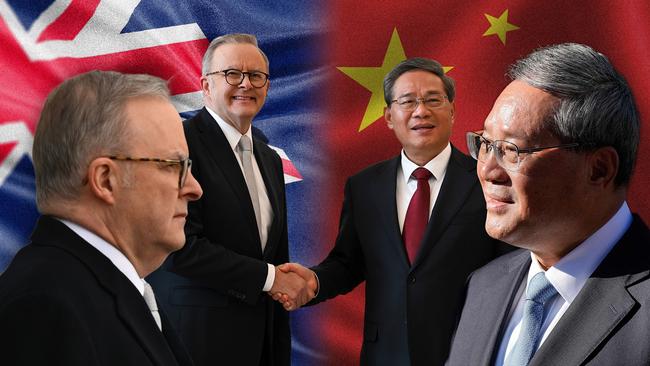
It was a different story when Anthony Albanese greeted Chinese Premier Li Qiang outside Parliament House, looking like a kid on Christmas Day.
He was positively beaming, shaking Li’s hand so enthusiastically it looked like he might do him an injury.
In what might have been a parallel universe just a few hundred metres away, an estimated 500 Tibetan, Uighur and Falun Gong protesters screamed their lungs out, branding Xi Jinping a “killer” and a “liar”. Many said they had family members in Chinese concentration camps.
They drowned out a roughly equal-sized group of flag-waving Chinese loyalists, who were lured to Canberra with offers of free food and accommodation by Beijing’s United Front network.
After his closed-door talks with Li, Albanese professed – yet again – the value of dialogue with China. But does he trust China to do what it says? Not on your life.
Despite all the smiles and gestures of friendship, the government has zero faith that China will ever be a reliable partner.
But the PM refused to concede the point, obfuscating in a press conference – which Mr Li declined to attend – about the value of “constructive discussions” with China’s leaders.
The surreal nature of the occasion was brought home by the presence of Sky News journalist Cheng Lei, who was jailed by the Chinese regime for three years on trumped-up spying charges. Cheng, who was only released in October 2023, took a seat with other reporters ahead of a joint statement by both leaders.
She happened to sit just behind members of the Chinese delegation, sparking a panic among the Premier’s minders.
Two Chinese officials stood between her and television cameras to block her image being seen on the state-run network, CCTV, for which she used to work before she became a pawn in Beijing’s coercive campaign against Australia.
Several Australian government staffers intervened, and the situation was defused.
“It was farcical,” Cheng said.
“I ended up feeling like an endangered species – like a panda – being protected by these Australian officials.”
The absurdity continued with the signing of five MOUs proclaiming new co-operation on trade, research and climate change.
None were released for scrutiny, but the idea of more research co-operation with Chinese scientists will send a chill through the national security establishment.
In a supremely ironic move after China’s three-year campaign of economic coercion against Australian exporters, Li committed to “enhancing the implementation” of the nations’ free-trade agreement. Meanwhile, Australian lobster remains banned by Beijing.
Later, Albanese hosted Li at a state lunch in parliament’s Great Hall, toasting the bilateral relationship with local Canberra wine that was until recently subjected to punishing Chinese sanctions, costing the industry $1.2bn a year in lost sales.
The PM confirmed in his solo press conference that he raised “the full range of Australia’s interests” during his closed-door meeting with Li, including China’s unsafe encounters with Australian ships and planes, and the plight of detained Australian writer Yang Hengjun.
One reporter asked what the response was when he raised Australia’s concerns.
“On some issues, there’s immediate agreement. On some issues there is not,” Albanese said.
He said one of the “practical measures” they spoke about was about improving military-to-military communication. It’s hoped this will avoid the sort of incident that occurred last month when a Chinese jet dropped flares in front of an Australian helicopter in international airspace, forcing it to take evasive action.
But China has shown its complete disregard for professional norms and international law by repeatedly making such aggressive interceptions. The US has documented hundreds of them, fearing a Chinese miscalculation could escalate into armed conflict.
Li claims the nations’ relationship is “back on track”. But it’s more like an uneasy detente that could blow up at any time. That’s the reality of dealing with China, and for all the bilateral warmth on display, Albanese knows it.







When Chinese President Xi Jinping meets foreign leaders, his face is impassive. Perhaps, if the occasion requires it, he might offer the barest hint of a smile.